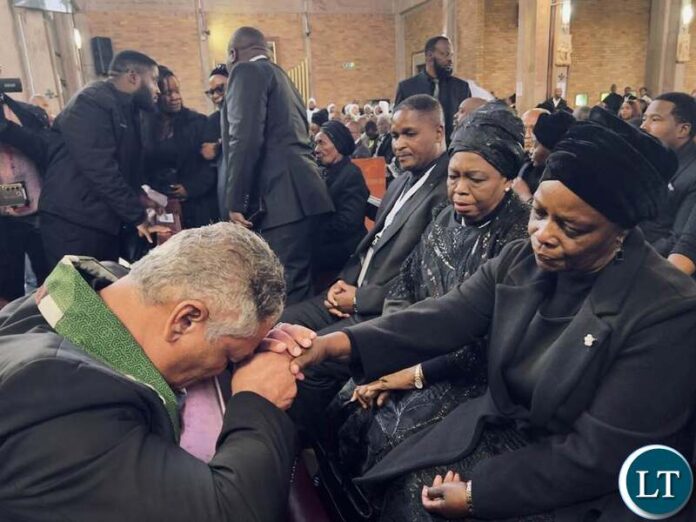Is the burial of former Zambian President Edgar Lungu in South Africa the end of the drama? Far from it. It is just the latest chapter in a saga that continues to grip Zambia’s deeply polarized political landscape. To bury a former head of state outside his own country is not only unprecedented—it is, in many eyes, a national embarrassment. For President Hakainde Hichilema, it marks more than a misstep. It is a political defeat.
As long as Lungu’s remains lie outside Zambian soil, his story remains unfinished—and President Hichilema’s image will be stained by accusations. In a country where cultural belief eclipses legal process, the Lungu family’s refusal to allow his burial in Zambia—despite repeated government overtures—carries enormous social and political capital.
For the opposition Patriotic Front (PF), this is not just a burial; it is a political opportunity. The party has framed the ruling United Party for National Development (UPND) as bitter and vindictive, accusing it of denying Lungu not just medical attention in his final days but also the dignity of a final resting place among his people. The PF’s story is clear. President Lungu, silenced in life, is now a political martyr—buried in exile, but resurrected in legacy.
No doubt the PF lost a president but gained a cause. Lungu may have failed to defeat Hichilema on the 2026 ballot, but in death, the public could bring him back—not in body, but in spirit, memory, and possibly through reburial under a future administration. Expect to hear “Lungu alebwela”—Lungu is returning—as a campaign refrain in the run-up to the 2026 elections. This time, however, the return will be more than political; it will be spiritual, symbolic—and possibly literal.
Beyond the campaign, however, lies something disturbing–the dangerous personalization of Zambian politics. When death becomes a political battleground, the nation crosses a moral threshold. Disagreement is democratic. Dehumanization is not and shouldn’t be. Have we forgotten that public figures are also human beings—fathers, mothers, spouses, siblings? When they die, their families remember every insult, every humiliation and every threat. In moments of mourning, words that wound haunt. Even sincere condolences may no longer suffice.
Toxic polarization is not new to African politics, but it is another thing once intertwined with traditional beliefs surrounding death. In many African cultures, rarely is death accepted as natural. It is believed to be caused by enemies, spiritual forces, or unseen powers. Within this worldview, grief morphs into suspicion, and suspicion into blame. Lungu’s death must be seen through this cultural lens. We are, after all, Africans with African beliefs. Some even whisper of ubwanga—witchcraft—playing a role in his death. However irrational such claims may seem, belief is not dictated by fact. It is shaped by emotion, history, and trauma. To some, the very calls for state control over Lungu’s remains have only deepened public mistrust. The optics of the state versus the bereaved are not just politically damaging—they are morally indefensible.
What, then, do we learn from this somber event? That power, even at its most absolute, is fleeting. Lungu—once Zambia’s most powerful man—died without securing what should be a basic right for any citizen–the right to be buried at home. It is a tragic irony that casts a long shadow not just over his legacy, but over the current government’s moral standing.
Whether Lungu gains posthumous political capital remains to be seen. But what is certain is that his death, and its handling, has left a lasting mark on our nation. He will be remembered not only as a former president, but as a man whose final resting place became a symbol of national division.
No number of official statements can undo the political damage. This is a moment of reckoning for President Hakainde Hichilema. It proves that even presidential power ends at the grave. Because ultimately, a burial is not just about where a body lies. It is about what the act represents.
Nonetheless, by choosing to bury Lungu outside Zambia, we have also made a public confession as a nation–we are divided, and dangerously so. Thanks to the late president, and President Hichilema, we can no longer pretend otherwise.
What will it take for us to unite?
Kaya!
Kapya Kaoma



For the first time I have read kapayas whole article because he is talking sense , for once…….
Burying the body in Zambia will be a huge loss for PF
FWD2031
Well put Kapya, Zambians have been saying there is a crisis and we are divided. Zamvians have been sayinv that since 2021, but government and its leadership have been denying that fact. You have laid it very well and bare. I hope your message can reach these chaps
The country is divided. Well laid out Kapya. I wonder why government has been refusing
The action by the South African court to halt the burial of ECL was the right thing to do on so many unaccountable aspects. There is nothing like winners or losers but the governance morality.
The best President Zambia ever had was ECL
@Independent cadre he was nowhere near the best President. However he was better than the current president. We could all sontapo even though they were just as thieving as the present ones
Kasongo has divided us, even his appointments are kasongolish.
Kasongo must go
Message approved
This article reminds me of a Zambian Book i once read called ” The Changing Tides” By Micheal Mulilo”.
Good luck to you Kapya Kaoma.
BS Article, wanting to undo what Kaunda worked so hard for. Zambians are united and they are smart to sense division. They did that in 2021, voted out PF with their division. FYI, citizens are tired of this ECL saga, at this point whether the dude is buried in SA or not is no one’s business. By now even the south africans are tired of this family’s obsession with burrying the man in SA. People are back to their hustle and ready to focus on other important issues.
Comments are closed.